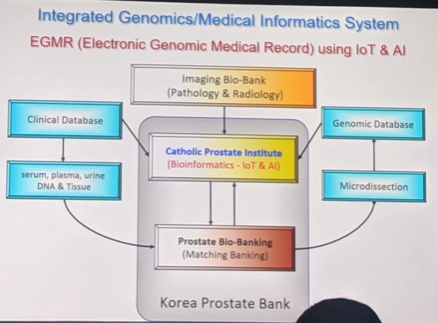SUO 2018: WUOF Lecture: Smart Care of Prostate Cancer Patients Using Artificial Intelligence & IoT - UroToday
The current trend in medicine is an increasing push towards precision medicine, using Big Data (bioinformatics), smart medicine, and artificial intelligence. Technology is creeping into all aspects of our lives and hospitals and medical care are no exception – smart hospitals are the future. The key lies in harnessing all the data gathered in an efficient manner to inform medical care and improve patient outcomes.
A “Smart Hospital” is built on an ICT environment of interconnected assets (the Internet of Things) aimed at improving treatment outcomes and patient convenience. It relies on Big Data Revolution – ‘the Fourth Industrial Revolution’ – which combines connected devices with cloud computing, big data analytics and artificial intelligence.
Some examples they are utilizing in his hospital incude: mobile pay, telemedicine, virtual rehabilitation, bio-telemetry, voice EMR, precision genomics medicine, robotics, etc.
Why is prostate cancer a good disease process to start with developing smart medicine? Because:
- It utilizes technology such as mpMRI that requires dedicated radiologists
- It utilizes pathology (Gleason score) that has high degree of variability amongst pathologists
- Treatment options vary significantly
- Has a relatively long survival rate
Management for prostate cancer is developing rapidly based on new RCT data. However, RCTs are expensive and require a long time of follow-up (10-15 years). In the absence of RCTs and level 1 data, expert opinion often prevails – and that can be subject to bias! Open-source web-based smart prostate cancer databases that draw from multiple institutions over a large population may help overcome some of these biases.
The first step is to develop a comprehensive database that includes:
- Smart Clinical Database (phenotype info)
- Bio-banking
- Smart Genotype Database (genotype info)
- Radiology Database
- Pathology Database
All of these must be used together, which requires AI to collate and interpret
For the rest of the talk, he provided examples of some of the work he has been able to do with national and international grant funding in Korea.
1) Korea Prostate Bank – Multi-institutional Prostate Banking

2) Korea Multi-Center Prostate Cancer Registry K-Cap
- Research network for prostate cancer
- 5 institutions currently
- About 11,200 patients enrolled so far
- It is web-based and pulls in data directly from the EMR
- Has a clinical, imaging and pathology component
- Links all 3 together
- Over 2018-2020, they have been directed to develop AI Software
- They have helped start a few new companies working in these areas with a focus on prostate cancer
- Vuno (1 company) – Deep Learning of 3T MRI imaging, matched with pathology imaging
- DeepBio (2nd company) – Prostate biopsy and whole specimen, Gleason scoring deep learning. Aims to provide automatic pathology reads with greater detail than current pathology evaluations. 97-99% cancer detection rates currently.
- LifeSimentics (3rd company) – focused on prognosis/prediction modelling, linked with Biobank and genomic data
4) mHealth Program for Prostate cancer
- Effective for ADT patients
- 2018 ASCO – presented an abstract demonstrating the results of this program
- Internet and Mobile based Lifestyle interventions – improved exercise capability and general HRQOL in ADT patients
He finished his talk with highlighting the role of medical tourism in Korea and why it is increasing. Their access to technology and their ability to provide multi-disciplinary care in a short period of time in addition to virtual telemedicine follow-up has made them a promising medical tourism site.
Presented By: Ji Youl Lee, MD
Written by: Thenappan Chandrasekar, MD, Clinical Instructor, Thomas Jefferson University, @tchandra_uromd, @TjuUrology, at the 19th Annual Meeting of the Society of Urologic Oncology (SUO), November 28-30, 2018 – Phoenix, Arizona
https://ift.tt/2FQqnXh


Comments
Post a Comment